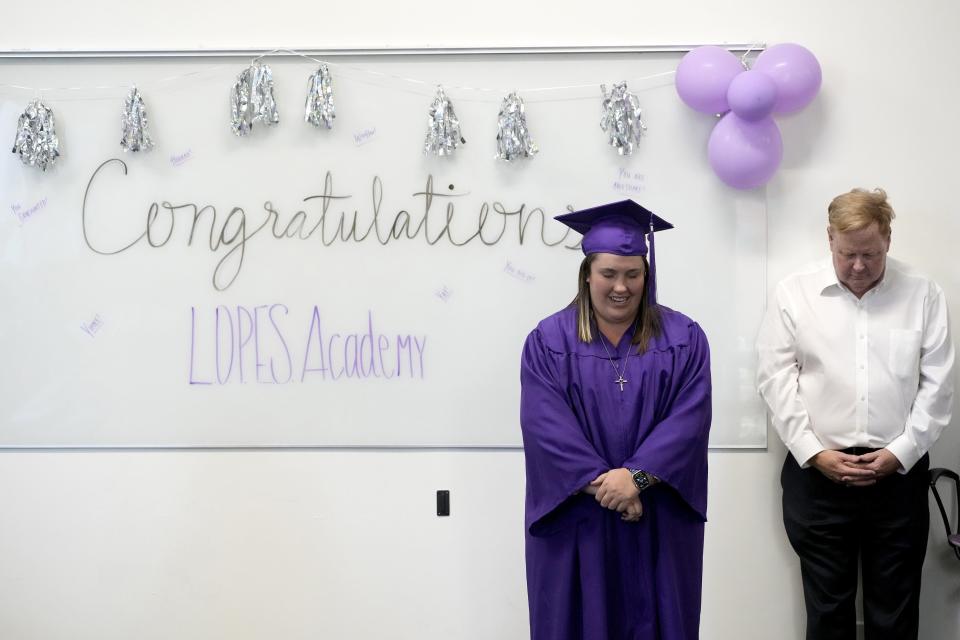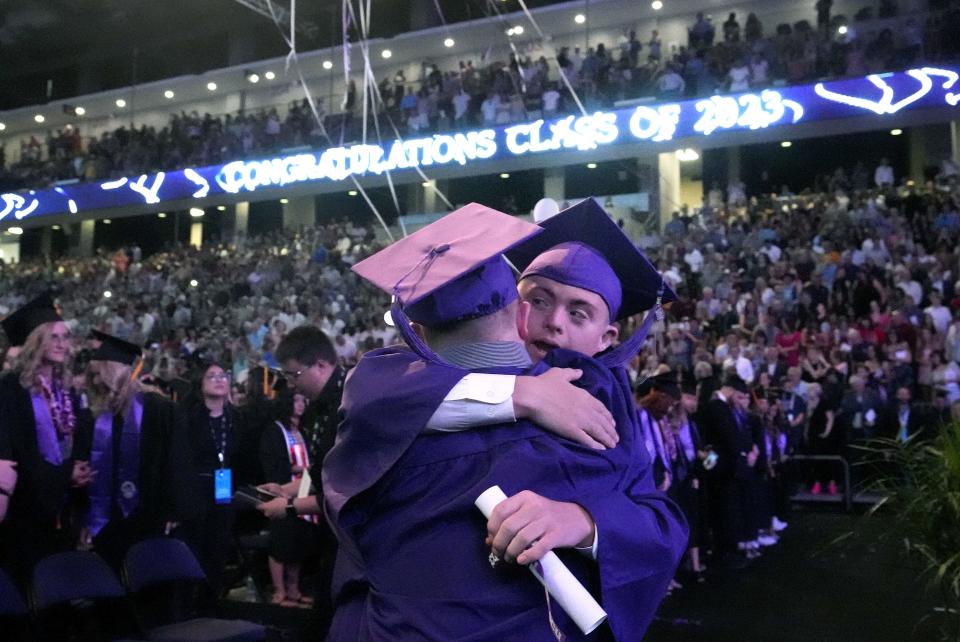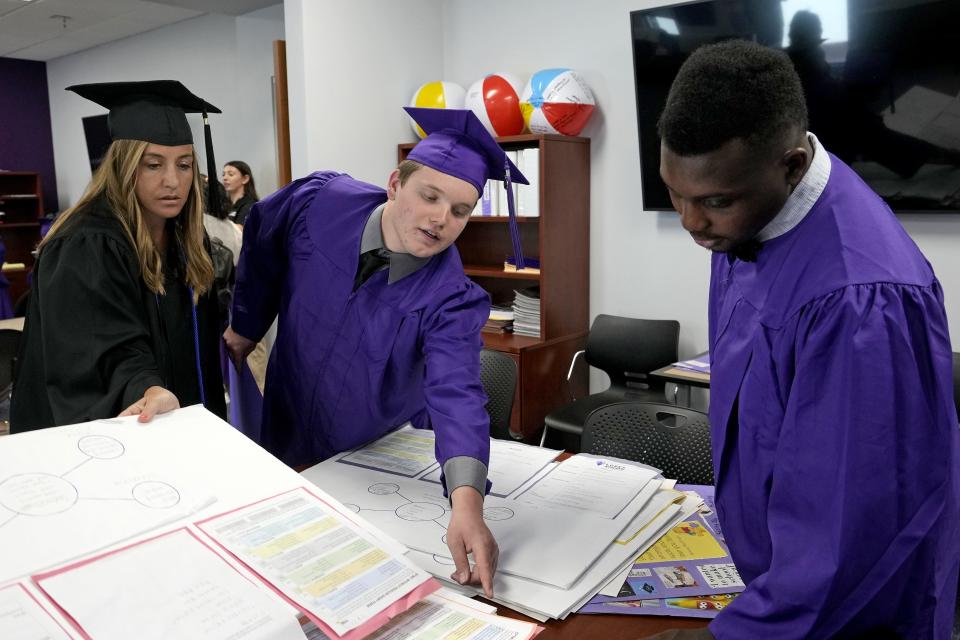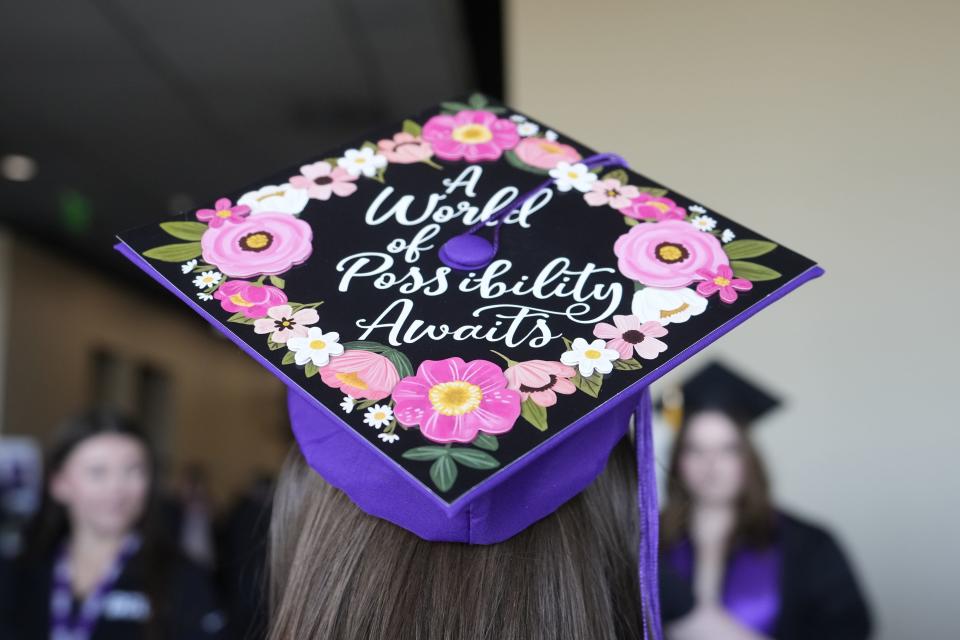GCU celebrates first cohort of program for people with intellectual disabilities
Jaden Lowery, 19, could hardly sleep the night before Grand Canyon University's commencement ceremony.
Filled with nerves and excitement, he tossed and turned in his bed at his family home in Phoenix. When he did finally manage to shut his eyes, it wasn't for long. It felt like "two minutes" before his mother was banging on his bedroom door to wake him, he said.
Hours later, he walked into the university's arena dressed in a bright purple graduation robe and cap. He sat in a row filled with his classmates and friends from the L.O.P.E.S. Academy, the university's two-year, non-degree program for people with intellectual disabilities.
"I feel blessed," he said.
Lowery and his classmates are the first cohort to complete the program, which is one of just a handful of higher education options in Arizona for young adults with developmental disabilities. It aims to immerse people with intellectual and developmental disabilities in the Christian school and prepare them for paid, meaningful work opportunities and independent living.
It's still too early to tell how successful the program might be in helping its participants gain employment. So far, two participants have secured permanent jobs off-campus, three are in the process of interviewing for jobs and the remaining four are still finding opportunities to apply for or choosing not to dive into work immediately, GCU officials said.
Life-changing surprise: Third graders given free college tuition at Phoenix elementary school
But results from other postsecondary programs for those with intellectual disabilities are encouraging. Upwards of 300 such programs exist across the country, and a recent survey of 38 federally-funded ones found that nearly half of all students who exited their programs between 2020 and 2021 had a paid job within three months.
Even still, there are disparities. That same survey found that most participants in programs for intellectually disabled people are men. And, in terms of racial diversity, a majority are white.
Those behind the initiative at GCU hope it might inspire more Arizona schools to offer non-degree programs for people who cannot complete a four-year degree but wish to receive workforce training and enjoy a college experience.
The state — and the Southwest as a whole — lags behind the rest of the country when it comes to higher education for neurodiverse people, said Heidi Boldway, assistant dean at GCU's College of Humanities and Social Sciences.
"After high school… there are no programs for the neurodiverse population — or very few programs," Boldway said. "They deserve a chance, too. They deserve a life, too."
Gonzaga model: Grand Canyon faces the program it aspired to be when it began DI
That bears out in employment and poverty rates. Just 29% of working-age Arizonans with cognitive disabilities were employed in 2019, the most recent year for which such data was available, according to a report from the Institute for Community Inclusion at the University of Massachusetts Boston. They made about half of what Arizonans without disabilities earned, and nearly 30% lived below the poverty line, according to the report.
"People like this are capable of very, very productive lives," said GCU President Brian Mueller. "They want to be a productive part of our society. They just need a vehicle to draw them out and get them there."

Scarce higher education options
In preparation for the embraces, tears and photos yet to come, Emma Cardon wanted to touch up her lipstick as she left the commencement ceremony. So, she made a beeline for the classroom and offices that bear her family name.
Cardon, 28, of Glendale, is the reason that the L.O.P.E.S. Academy exists.
When she graduated high school, she knew she wanted to go to college, just like her siblings. But her options were limited.
In Arizona, there are currently three programs that specifically offer higher education access to students with intellectual disabilities, including GCU's L.O.P.E.S. — Learning Opportunities for Participation and Engagement in School — Academy.

One, founded at the University of Arizona more than a decade ago, allows people with special needs to audit college courses. Like at the L.O.P.E.S. Academy, the program lasts two years, and participants receive a certificate of completion. But that program, called Project FOCUS, is only available to those attending a Pima County high school, barring Phoenix-area residents like Cardon from enrolling.
Another is the Supporting Inclusive Practices in Colleges program based at Northern Arizona University. The university partners with several college campuses in northern Arizona to help people with intellectual disabilities pursue a variety of degrees, certifications and credentials. The program includes educational coaches and peer mentors for students but only serves those who are capable of learning and participating in classrooms with students who don't have an intellectual disability.
Other Southwestern states have similarly sparse options. In New Mexico, there are two options: Job training in Roswell or a career and life readiness program in Farmington. Colorado has five higher education programs for people with intellectual disabilities, including one at a community college that allows students to take typical courses for credit. Nevada has two programs; Utah offers three. And while some programs accept out-of-state students, not all people with intellectual disabilities are able or willing to live alone, or far from family and friends.
GCU was Emma Cardon's dream school, and her parents, Don and Kim Cardon, wanted her and others with intellectual disabilities to have the opportunity to attend.
Meet Morrison Warren: Phoenix's first Black councilmember and a lifelong educator
"We don't want to set boundaries on them, and so we're trying to get them to even believe that the world esteems them enough and believes in them enough to let them do things that people don't think that they can do," Don Cardon said.
They partnered with the university to found the L.O.P.E.S. Academy at the Cardon Center in 2021, donating $500,000. That money went toward funding the program and its staff.
Two years later, as Emma Cardon prepared to walk across the graduation stage, she radiated excitement. Good things are yet to come, she said. She'll spend part of her summer working as a hostess at a restaurant in Flagstaff, where her family goes each year to escape the Phoenix heat.
After that, her plans are unclear. But with the program under her belt, she doesn't seem worried. She said it has allowed her a shot at a more independent life.
"I'm very shocked that I'm graduating," she said. "But I'm happy."

A full course load
To get to the commencement ceremony, L.O.P.E.S. Academy participants complete courses on topics ranging from professionalism and communication to nutrition and Christianity.
Participants are required to be on campus for classes two days per week and take two classes each semester. They don't live in GCU's dormitories but take part in other extracurricular aspects of campus life, including activities hosted by student groups, sporting events and weekly chapel services.
Their time at GCU culminates with a one-semester, on-campus internship. Some, like Lowery, get customer service experience. He worked in the Lopes Shop, GCU's student bookstore. Others are trained in food preparation and data entry.
Although students work, the internship isn't paid because it's part of a university course, GCU officials said.
Participants are encouraged to have active lives off-campus, too. The classmates occasionally get together for hangouts outside of class. Past adventures have included going to the movies and a rock climbing gym. And some have side projects. For instance, 29-year-old Lindsey Eaton runs a blog about her experience as a person with autism.
Smallest migrants, toughest journey: Uprooted kids suffer years of education loss
The idea is to expose participants to the same college environment as their siblings and friends without disabilities, said program manager Allison Mancinelli Kolanko.
"They want that experience, too," she said.
For GCU, the program comes with two bonuses: A chance to recruit L.O.P.E.S. Academy participants permanently for the university's workforce needs and an opportunity for students with and without intellectual disabilities to intermingle and learn from each other.
"It makes the students feel good that we're willing to include people who don't come with 3.9 GPAs," Mueller said. "Our students and their willingness to serve and support these students — it's part of their education."

Looking to the future
As the classmates gathered for a party after the commencement ceremony, Bolday and Mancinelli Kolanko admitted they couldn't make it through the event with dry eyes.
"I shed some tears," Mancinelli Kolanko said. "It's bittersweet. I always say it's not the end, though. It's just the beginning."
Cardon isn't the only L.O.P.E.S. Academy grad with plans moving forward. Eaton will work as an office assistant. And Lowery's best friend, 20-year-old Kyle Bragelman, said he already has a job lined up working with a landscaping company. He dreams of one day working in a movie theater, he said.
Meanwhile, the university is planning for the future of the program. Next year's cohort is 12 participants, and Mueller said he hopes to see the program grow in size and impact. He predicts the class of 2025 will be double the size of this year's cohort.
"I think we're just beginning," he said. "There's literally hundreds, if not thousands, of young people that have a lot to contribute, and they need an avenue to bring out the capabilities that they have."
Don and Kim Cardon have already committed to a second round of funding for the L.O.P.E.S. Academy, excited by future possibilities for participants. Don Cardon said he envisions some participants eventually becoming leaders of small businesses. He said their next donation will exceed the amount they've already given.
"Our giving won't stop until we're not here anymore," he said.
With more donor money coming in, Muller said the school is committed to keeping tuition at $5,000 or less.
"Our goal is to make private higher education affordable to all socioeconomic classes of Americans," he said. "If we do anything, we'll lower it. If we can find ways to lower it, we'll lower it."
As Serena Lowery gazed down at her son in the university's arena, she said he has become "a social butterfly" and grown spiritually. She is thankful that her family took the step of enrolling him in the program, she said.
"We didn't think he would be able to go to college after high school" because there were no suitable programs at the time, she said. "But we kept fighting for something to happen… that has always been his dream, to be like his sisters and brothers and go to college."
When Jaden Lowery's name was called, his mother and the rest of his family burst into loud cheers.
Turning toward the stands, Jaden Lowery looked at his mother with a wide grin.
"That's me," he mouthed to her.
Education funding: Hobbs launches new grant to replace Ducey's AZ On Track summer program
Sasha Hupka covers higher education for The Arizona Republic. Do you have a tip on access and equity at Arizona's universities, community colleges or trade schools? Reach her at sasha.hupka@arizonarepublic.com. Follow her on Twitter: @SashaHupka.
This article originally appeared on Arizona Republic: GCU program lets people with intellectual disabilities boost education

